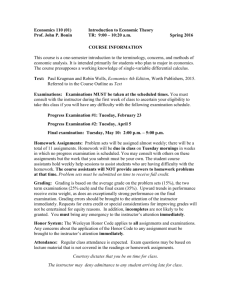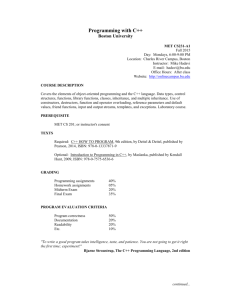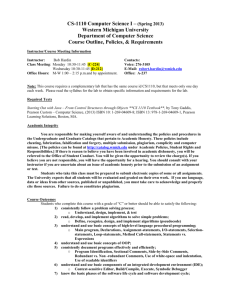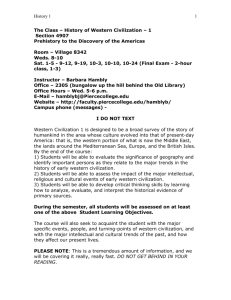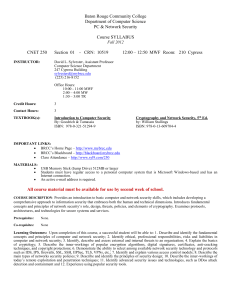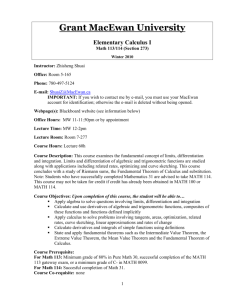Biology 100 Fall 2004 Syllabus
advertisement
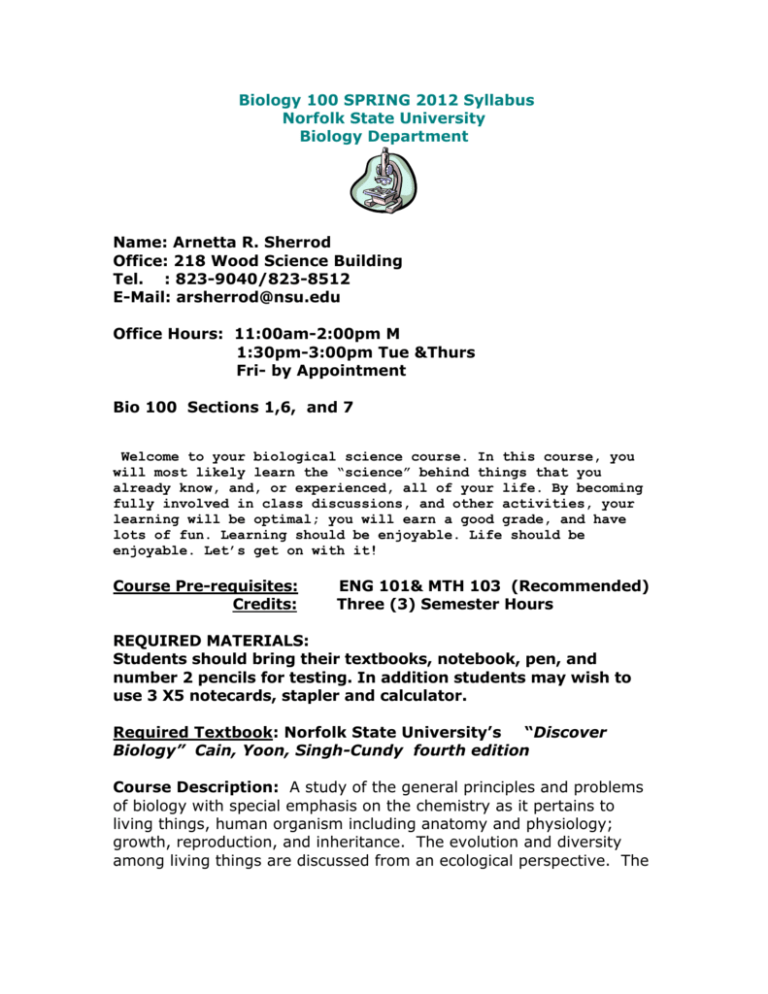
Biology 100 SPRING 2012 Syllabus Norfolk State University Biology Department Name: Arnetta R. Sherrod Office: 218 Wood Science Building Tel. : 823-9040/823-8512 E-Mail: arsherrod@nsu.edu Office Hours: 11:00am-2:00pm M 1:30pm-3:00pm Tue &Thurs Fri- by Appointment Bio 100 Sections 1,6, and 7 Welcome to your biological science course. In this course, you will most likely learn the “science” behind things that you already know, and, or experienced, all of your life. By becoming fully involved in class discussions, and other activities, your learning will be optimal; you will earn a good grade, and have lots of fun. Learning should be enjoyable. Life should be enjoyable. Let’s get on with it! Course Pre-requisites: Credits: ENG 101& MTH 103 (Recommended) Three (3) Semester Hours REQUIRED MATERIALS: Students should bring their textbooks, notebook, pen, and number 2 pencils for testing. In addition students may wish to use 3 X5 notecards, stapler and calculator. Required Textbook: Norfolk State University’s “Discover Biology” Cain, Yoon, Singh-Cundy fourth edition Course Description: A study of the general principles and problems of biology with special emphasis on the chemistry as it pertains to living things, human organism including anatomy and physiology; growth, reproduction, and inheritance. The evolution and diversity among living things are discussed from an ecological perspective. The course will require Internet access as resources and a portion of work are found on the Internet. COURSE RATIONALE: Bio 100 is a part of the general education core at Norfolk State University. This core provides the foundation for the University’s mission to develop in students the knowledge, qualities and attitudes necessary to become productive citizens who contribute to a globally and rapidly changing society. COURSE GOALS AND INTENDED OUTCOMES At the end of this course the student will be able to: 1. Demonstrate the ability to meet core concepts at 70% 2. Understand and appreciate the unifying characteristics, diversity and complexity of living things 3. List those elements and compounds that are common to living organisms 4. Explain how chemistry and especially organic compounds relate to the make–up and functioning of living organisms 5. Identify and describe the structures and functions of the cell and its cell components. 6. Discuss and describe the mechanisms that control cell division and the outcome of division. 7. Demonstrate a basic understanding of concepts of simple Mendelian genetics and inheritance 8. Identify and label the major organs of the organ systems of the body. 9. Discuss conservation actions and implications COURSE REQUIREMENTS: Attendance Policy: All students are expected to attend every class. In the event a student misses a class due to illness or a death in the family, a written statement from the appropriate administrative office will be needed. All students missing class are responsible for the material covered. The university’s attendance policy states that no more than 20% of class meetings (excused or unexcused) may be missed by a student during a given semester. At the discretion of the instructor, a student whose absences exceed 20% of scheduled class meetings of the semester may receive a grade of “F” for the course. Use of Technology: Students will be expected to make the necessary arrangements to access the internet so that they can utilize research internet resources, and regularly check their university student e-mail account and Blackboard Account. Technology usage will be integrated into all aspects of the course. Examinations: There will be four major examinations given in this course. In addition, a comprehensive final examination will be given to all students. Other methods of assessment will also be used in determining your final grade. Procedure for Makeup examinations: Students missing an exam for ANY reason (including official university business, illness (with medical excuse), death in family) will need to arrange with the instructor for a make-up exam on AMNESTY DAY. Academic Integrity Policy: All students should exhibit academic honesty in all academic exercises and assignments. An incident of academic dishonesty occurs when a student commits any of the following acts: o Cheating: Intentionally using or attempting to use unauthorized materials, information or study aids in any academic exercise, which includes all forms of work, submitted for credit or hours. o Fabrication: Intentionally or unauthorized falsification or invention of any information or citation in an academic exercise without prior approval of the author. o Plagiarism: The deliberate adoption or reproduction of ideas or words or statements of another person(s) as one’s own, without acknowledgement. (reference: student handbook) COURSE OUTLINE AND CALENDAR Week 1 Characteristics o o o o o Week 2-3 Chapter 1 – The Nature of Science and the of Life The work of science The characteristics of living things Viruses The biological hierarchy Energy flow through Biological Systems Chapter 4 – Chemical Building Blocks The physical world is made of atoms Covalent bonds Hydrogen and ionic bonds The pH scale The building blocks of living systems ** CONCEPT REVIEW SESSION*** EXAMINATION I – Week 4 Week 4-5 Compartments Chapter 5 – Cell Structure and Internal The cell theory Role of the plasma Membrane Prokaryotic versus eukaryotic cells The function of each cellular organelle Week 6 Chapter 6 –Cell Membranes, Transport, and communication The Plasma Membrane Active and passive transport How the Membrane Transporters Work Which way will water move Cell membrane mediated transport ** CONCEPT REVIEW SESSION*** Week 7-8 Chapter 9 – Cell Division Week 8 EXAMINATION II- MIDTERM ADVISORY WEEK WEEK 9 S P Week 10 Week 12 R I N G B R E A K Chapter 10 – Patterns of Inheritance Week 11 The Cell Cycle Mitosis and Cytokinesis Meiosis: Reduction division- the making of gametes Genes are units of instruction for inheritable traits Basic Patterns of Inheritance Mendel’s Laws of Inheritance Extensions of Mendel’s Laws Most phenotypes are shaped by genes and the environment Chapter 11- Chromosomes and Human Genetics The Role of Chromosomes Genetic linkage and crossing over Human genetic disorders Autosomal inheritance Sex-linked inheritance Chapter 29 - Reproduction and Development Human reproduction and development Sexual and asexual reproduction in animals Sexually Transmitted Diseases The fertilization process The process of cleavage and implantation ** CONCEPT REVIEW SESSION*** EXAMINATION III – WEEK 12 Week 13 Chapter 21 – Animal Nutrition and Digestion Nutrients that animals need The human digestive system Special adaptations of animal digestive systems Week 14 Environment Chapter 20 – Maintaining the Internal Week 14 & 15 Characteristics of homeostasis Regulation of water and solute concentration Week 15 Chapter 23 – The Circulatory System The human cardiovascular system Blood vessels and blood flow Comparing circulatory systems among animals Human health conditions affecting cardiovascular system Chapter 22 - Gas Exchange Breathing in humans Principles of gas exchange ** CONCEPT REVIEW SESSION*** Week 16 Chapter 16 - How Evolution Works Biological evolution Mechanisms of evolution Evolution can explain many characteristics Evidence that evolution happens Chapter 33 – The Biosphere Why is Ecology important? Interactions with the environment Climate’s effect on the biosphere Life on land and water Week 16 Week 16 Chapter 36 – Communities of Organisms The effects of species interactions on communities Communities change over time Recovery from disturbance EXAMINATION IV – week 16 AMNESTY DAY (IF OFFERED) OCCURS DURING THE LAST WEEK OF CLASS This schedule is subject to change at the discretion of the instructor, weather conditions, or progress of the class Evaluation: Evaluation will be based upon the level of achievement reflected by timely completion of work, dedication to the exploration of science, periodic critiques, and written assignments. Grading: 50% 4 Exams 20% Final Exam 30% Projects/special assignments, homework, quizzes at the instructors discretion. Special homework assignments are the only form of extra credit offered in this course. Take advantage of it when it is assigned. Grading Scale: 100-90 = A 89-88 = A87-85 = B+ 84-80 = B 79-78 = B77-75 = C+ 74-70 = C 69-68 = C67-65 = D+ 64-60 = D 59-57 = D56-below = F The instructor reserves the right to modify course content to reflect current issues that will be beneficial to the student’s academic development. In accordance with Section 504 of the 1973 Rehabilitation Act and the Americans with Disabilities Act (ADAO of 1990, we ask if you have a disability or think you have a disability, please make contact with the Supporting Students through Disability Services (SSDS) Office. A student who has not been in attendance by the third week of class will be deleted from the roster. For any grievances please refer to the protocol established in the NSU Student Handbook. Classroom Attitudes and Behavior: 1. Attendance is Mandatory. Roll will be taken each class period. You will have assigned seats. If your seat is empty then you’re considered absent. 2. Arrive on time!! If you are late, take your seat quietly and orderly. 3. Cell phones, and other electronic devices should be silenced for the duration of the class. If an emergency arises and you must answer your phone, please leave the room and do not return until the next class period. 4. Sleeping, talking or other forms of overt inattention that distract the instructor or other students will not be tolerated. This includes texting. 5. Disrespectful and disruptive conduct in class will not be tolerated. Those students will be removed from class . 6. Your name must be on the official roster in order to receive a grade for the semester. YOU are responsible for making sure you are properly enrolled. 7. Remove hats, sunglasses, and wave caps when entering class. 8. Dress appropriately and respectably for learning in an academic environment. 9. Please try to take care of personal needs before class begins. THERE ARE NO BATHROOM BREAKS DURING EXAMINATIONS. 10. All electronic devices must be removed from your desk during examinations. 11. If you miss the first two weeks of class your name will be lined out on the roster and you may be de- registered from the class. 12. Accessibility to Blackboard is a requirement. You are enrolled in the blackboard course when you register for the course. Make sure you have computer access to it. All of your class assignments and announcements will be on blackboard. Although Blackboard is not my official roll book, you can monitor your assignments there. Final Examination Schedule: To be announced
